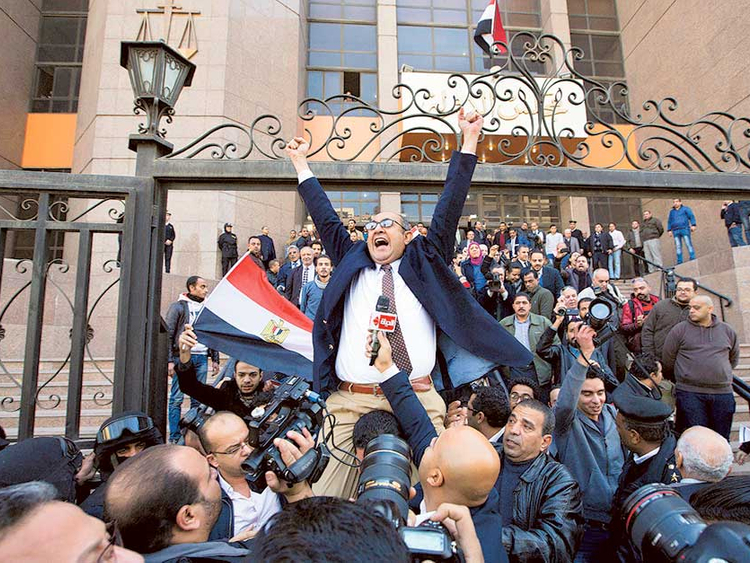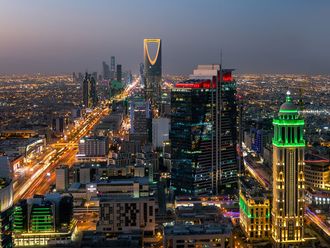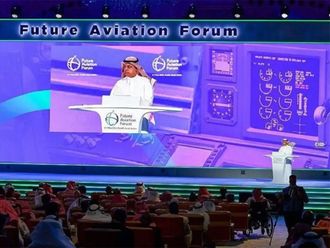Paris: Saudi Foreign Minister Adel Al Jubeir said on Monday he was positive about the way the incoming US administration wanted to restore American influence in the world, contain Iran and fight Daesh.
“We are optimistic about the incoming administration and look forward to working with it in all areas that are a concern for both of us,” Al Jubeir told reporters in Paris.
“We will look at the Trump administration’s view as articulated. Wanting to restore America’s role in the world, we welcome this. Wanting to defeat [Daesh], absolutely. Wanting to contain Iran ... absolutely.” Al Jubeir said the interests of Saudi Arabia were aligned with those of the United States, be it geopolitically — in Syria, Iraq, Yemen and Iran — or on energy and financial issues.
“The objectives we want to achieve are the same. We may have disagreements on how to get there, but we don’t disagree on what needs to be done, and that will not change,” he said.
When asked specifically about Riyadh’s relationship with its regional rival Iran and whether there could be a detente between them, Al Jubeir accused Tehran of destabilising the region.
Relations between the two worsened after hundreds of people, many of them Iranians, died in a crush at the 2015 Haj in Saudi Arabia. Iran blamed the disaster on organisers’ incompetence and boycotted last year’s Haj.
Ties worsened further when Saudi Arabia executed a local Shiite cleric a year ago. Angry Iranian protesters stormed the Saudi embassy in Tehran and Riyadh severed diplomatic relations.
“Our relationship with Iran is tense and it’s in function of its aggressive and hostile policies. It would be wonderful to live in peace and harmony with Iran, but it takes two to tango,” Al Jubeir said, speaking in English.
“We can’t be subject to death and destruction and expect to turn the other cheek. We tried, but it didn’t work.” Al Jubeir added that proposed talks in the Kazakh capital Astana aimed at reaching a ceasefire in Syria were worth testing. However, it should not be construed as Riyadh abandoning moderate rebels fighting to topple Iranian-backed President Bashar Al Assad.
“The objective is to arrive at a ceasefire and move on to the political process. Let’s test it. So far it hasn’t succeeded,” he said. “If it does, then we go down the political path, but that doesn’t mean we abandon the moderate opposition.” The Astana talks, which are backed by Russia and Turkey, are due to take place later this month, with rebel military factions set to hold face-to-face negotiations with a government delegation.
Al Jubeir, whose country has given military support to the opposition forces, said there had been close consultations with Turkey on the meeting and that it did not believe Ankara had changed its view on Al Assad leaving power at the end of a transition.
“I don’t see a change in Turkey’s position. The fact the Turks are talking to Russians is not a concern. Turkey has people on ground in Syria and has direct contact with the Syrian opposition on ground,” he said.
Al Jubeir hit back at suggestions by some French presidential candidates that Riyadh funds Islamist extremism in France and that bilateral ties between the two allies should be reviewed.
With less than four months before France’s elections, the favourites - conservative Francois Fillon and far-right National Front Marine Le Pen - have both stepped up anti-Gulf rhetoric in recent weeks.
Both say Paris should review ties with Saudi Arabia and Qatar and suggest it has an unhealthy relationship with countries they say propagate a radical Islamist ideology in France.
“I can’t comment on what’s said during an election campaign, but I know there is a misperception of Saudi Arabia,” Al Jubeir told reporters late on Monday. “People say Saudi Arabia is extremism. Saudi Arabia is intolerance. Saudi Arabia is funding radical institutions and I always say it’s not true.” The debate in France has been stoked by a spate of Islamist militant attacks over the last two years, which prompted calls for a stricter control of foreign financing of mosques.
“When people say the Saudis are funding this, I say show me. Nobody has anything to show, but the image has stuck and becomes a reality,” Al Jubeir said.
A French parliamentary report on mosque financing concluded in July that overseas financing was “marginal”.
According to the Saudi Embassy, the kingdom has financed eight mosques around the country, at a cost of about 3.7 million euros, and paid salaries for 14 imams.
“They (extremists) want Makkah and Medina. For people to think that we would be funding a mindset whose objective is to kill us, you’d have to assume we were either naive or not very smart,” he said.
Al Jubeir said critical French politicians would be better off looking at the strong trade, political and security ties between the countries and assess positively Riyadh’s management of oil markets and financial investments to help global economic growth.
“I would imagine things should be the other way round and that they would want stronger French-Saudi ties,” he said.












